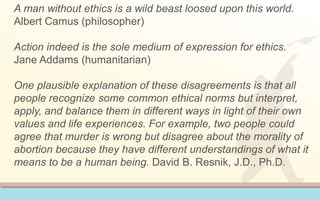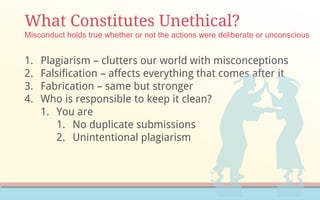Ethical review 2017
- 1. Exploiting Rapid Change in Technology Enhanced Learning … for Post Graduate Education Ethical Review & Internal Review Board
- 2. A man without ethics is a wild beast loosed upon this world. Albert Camus (philosopher) Action indeed is the sole medium of expression for ethics. Jane Addams (humanitarian) One plausible explanation of these disagreements is that all people recognize some common ethical norms but interpret, apply, and balance them in different ways in light of their own values and life experiences. For example, two people could agree that murder is wrong but disagree about the morality of abortion because they have different understandings of what it means to be a human being. David B. Resnik, J.D., Ph.D.
- 3. Agenda A Quick Overview 1. Ethics in life 2. Ethics in research 1. The rules 3. What constitutes unethical? 1.The challenges The Practical 1. Lining up the parts 2. Ensuring ethics throughout 1. Consider replicability
- 5. Ethics in Life We all stand somewhere on this continuum – Know where you stand and then consider your choices from there as the standard changes in research A way of life – NOT an event Deontological vs. Utilitarian
- 6. Ethics in Research Codes of Scholarly Conduct Defined by Each Institution Contains certain universal ideas: 1. The treatment of human subjects. 2. Honesty 3. Maintaining integrity of all experiments and research 4. Publishing the research and results 5. Granting access to others to allow reproduction of the testing 6. Personal responsibility for the research 7. Acknowledging others contributions (not just citations)
- 7. What Constitutes Unethical? 1. Plagiarism – clutters our world with misconceptions 2. Falsification – affects everything that comes after it 3. Fabrication – same but stronger 4. Who is responsible to keep it clean? 1. You are 1. No duplicate submissions 2. Unintentional plagiarism Misconduct holds true whether or not the actions were deliberate or unconscious
- 8. What Makes Ethics Tricky? 1950s • Animals not considered • Experiments on people in care • Anything goes if the person agrees to sign off on it • Conflicts of interest between research /business • Salami slicing common 2050s • Animals have rights as subjects too • Protected status for children/prisoners – who next? • Should any experiments mess with DNA? Allow for cross breeding species? • Not allowed • Embryo mapping? Brain cell manipulation? Chipping people / or other forms of life? • Salami slicing cause for withdrawal Time, Cultural understanding of life, Science
- 9. The Practicalities of Designing and Proving Ethics
- 10. Practically, What is Ethical Review Standards suit the discipline and the institutions. 1. Protect institution from bad research 2. Protect the public (from time wasting to danger) 3. Protect against errors that could lead to falsification or fabrication 4. Protect values such as trust, accountability, mutual respect and fairness
- 11. Practically, What is Ethical Review Practically, how does this translate to YOU? 1. Not to have a biased point of view 2. Not to ask questions that don’t relate to your problem or questions directly 3. Don’t manipulate questions or later data to reflect what you want them to reflect 4. Informed consent 5. No harm for participating or not 6. No undo influence from researcher to participants 7. Neutrality is key
- 12. Making it all Match Up Nothing out of line
- 13. Making it all Match Up Useful Tools Research questions Type of Instrument Specifics – probes/sub questions etc Sample Outcome Research Question List each research question (RQ) in a separate row below. Data Collection Tools List which instrument(s) are used to collect the data that will address each RQ. Datapoints Yielded List which specific questions/variabl es/scales of the instrument will address each RQ. Data Source List which persons/artifacts/ records will provide the data. Data Analysis Briefly describe the specific statistical or qualitative analyses that will address each RQ.
- 14. Remember… Specificity is your friend
- 15. Q & A Let it all out – what have you heard? What are you curious about?
- 16. What’s Up at DoctoralNet? Have you scanned all the webinars for this quarter? You might want to do that as they are filling up and do not have an unlimited number of spaces. May 2017 = thinking/planning ahead for summer Backwards Map your Summer: Block Out Your Time: Control Panel/Center Section/Planning and Time M… Turn off Distractions Get the Help You Need Quickly… Members – set up skype: doctoralnet Or email Margie@doctoralnet.com
















